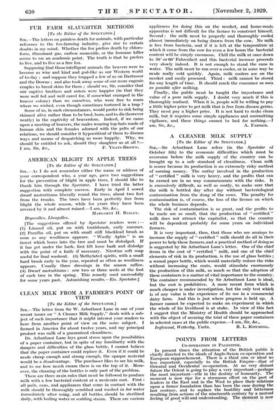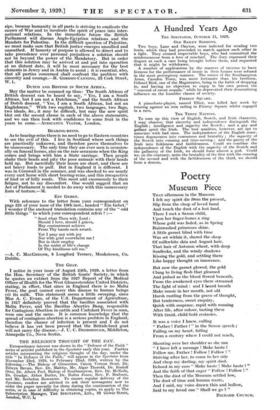POINTS FROM LETTERS
CO-OPERATION IN PALESTINE.
In present times the attention of the British public is chiefly directed to the ideals of Anglo-Saxon co-operation and European rapprochement. There is a third'akin or ideal no less important, especially to the British Empire—that of Oriental and Occidental co-operation. At no very distant future the Orient is going to play a very important—perhaps the most important—role in the destiny of humanity. The moment is now ripe for a strenuous effort on the part of leaders in the East and in the West to place their relations upon a firmer foundation than has been the case during the last century, and to replace the hostility and bitterness resulting from actions of the nineteenth century by a mutual feeling of good will and understanding. The moment is now ripe, because humanity in all parts is striving to eradicate the causes of War and to inculcate the spirit of peace into inter- national relations. In the immediate future the British Parliament will discuss Anglo-Egyptian relations and the Mandate for Palestine. In the difficult question of Palestine, we must make sure that British justice emerges unsullied and unscathed. If honesty of purpose is allowed to direct and to take precedence over personal prejudices a solution should not be beyond the power of the Mandatory. But in order that this solution may be arrived at and put into operation at no distant date, it will be most necessary for the best elements in Jewry and in Arabia to assist ; it is essential, also, that all parties concerned shall confront the problem with sincerity and courage.—R. Goanox-CAxxxxo, 23 Cork Street, W. 1.
DUTCH AND BRITISH IN SOUTH AFRICA.
May the matter be summed up thus: The South African of British descent can be heard to say, "Yes, I am a South African, but I am not a Dutchman, and the South African of Dutch descent, "Yes, I am a South African, but not an Englishman." With two capitals, two languages, two flags, two ideals, 8re., it may be difficult, but may the new spirit blot out the second clause in each of the above statements, and we can then look with confidence to some fruit in the years to come.—AFRICANUS VIATOR, London.
BEARING-REINS.
As to bearing-reins there is no need to go to Eastern countries to see the evil of this. I live in Scotland where such things are practically unknown, and therefore prove themselves to be unnecessary. The only time they are ever seen is occasion- ally on funeral horses, also on the rare occasions when the King comes and brings with him a State carriage. Then people shake their heads and pity the poor animals with their heads held up. But mercifully their hours are short, and there are not heavy loads to pull. But in England it is different. I was in Cornwall in the summer, and was shocked to see nearly every cart horse with short bearing-reins, and this irrespective of load or of hilly roads. This must add enormously to their fatigue, not to say discomfort. One would suggest that an Act of Parliament is needed to do away with this unnecessary form of torture.—M. EIN GEBET.
With reference to the letter from your correspondent on page 531 of your issue of the 10th inst., headed "Em Gebet," I wonder if the enclosed translation contains any of the "odd little things " to which your correspondent refers ? :— "Send what Thou wilt, Lord : Should I love, should I grieve, May contentment achieve From Thy hands each award.
Yet I pray not with joy Nor with grief overwhelm me I But in their employ In the midst of life's change Of Thy kindliness tell me."
—A. C. MACGREGOR, 8 Longford Terrace, Monkstown, Co. Dublin.
THE GOAT.
I notice in your issue of August 24th, 1929, a letter from the Hon. Secretary of the British Goats' Society, in which he quotes an extract from the 1927 Report of the Medical Officer of Health for the West Gloucestershire United Districts, stating, in effect, that since in England there is no Malta Fever, the goat cannot carry this disease to human beings vici its milk. This statement seems a little sweeping, since Miss A. C. Evans, of the U.S. Department of Agriculture, in 1917 definitely proved that the bacillus associated with Malta Fever, and the Bacillus Aborties Bang, responsible for Contagious Abortion in cattle and Undulant Fever in man, were one and the same. It is common knowledge that the spread of contagious abortion is a serious problem in England; therefore the chance of infection is present and I do not believe it has yet been proved that the British-bred goat will not carry the disease.—J. U. C. DESBOROUGH, Middleton, Annapolis Co., Nova Scotia.









































 Previous page
Previous page